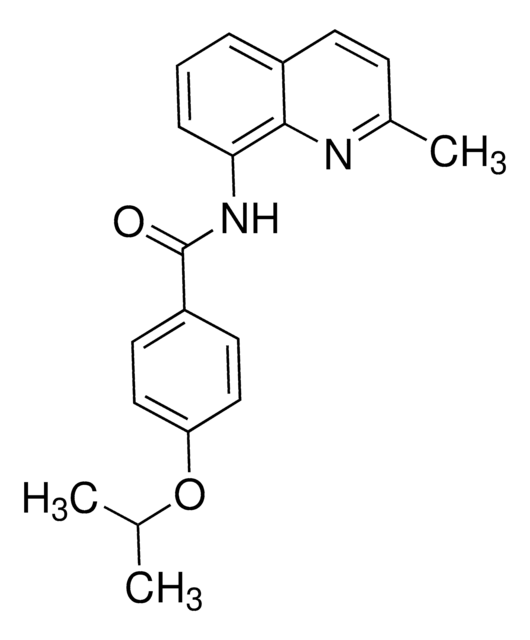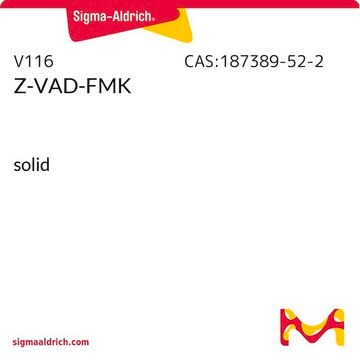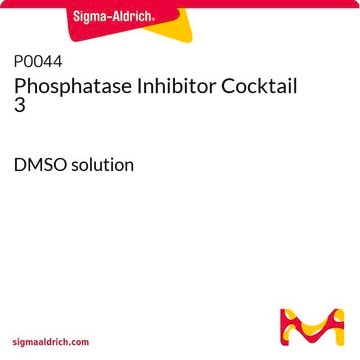SML2100
RIPA-56
≥98% (HPLC)
Synonyme(s) :
N-Benzyl-N-hydroxy-2,2-dimethylbutanamide, RIPA56
Se connecterpour consulter vos tarifs contractuels et ceux de votre entreprise/organisme
About This Item
Formule empirique (notation de Hill):
C13H19NO2
Numéro CAS:
Poids moléculaire :
221.30
Code UNSPSC :
12352200
Nomenclature NACRES :
NA.77
Produits recommandés
Pureté
≥98% (HPLC)
Forme
powder
Couleur
white to beige
Solubilité
DMSO: 2 mg/mL, clear
Température de stockage
2-8°C
Catégories apparentées
Actions biochimiques/physiologiques
RIPA-56 is a metabolically stable type III kinase inhibitor that targets receptor-interacting protein 1 kinase (RIP1; RIPK1) in a highly potent and selective manner (RIP1 IC50 = 13 nM) by locking RIP1 in its inactive form, exhibiting no inhibitory potency toward RIP3, IDO or a panel of multiple kinases (tested at 10, 200, and 5 μM, respectively). RIPA-56 protects against TNFα-induced necroptosis (necrosis) upon apoptosis/NF-κB pathway blockage (EC50 = 27 nM/murine L929 and 28 nM/human HT-29 cells) in cultures as well as TNFα-induced mortality and multiorgan damage in a murine model of systemic inflammatory response syndrome (SIRS) in vivo (100% survival rate with 3 mg/kg/12 h or single 6 mg/kg i.p.) with good pharmacokinetics and bioavailability (F post 10 mg/kg p.o. or i.p. dosing = 22% and 100%, respectively, of 2 mg/kg i.v.). Long-term daily RIPA-56 supplementation (150 or 300 mg/kg in chow) is reported to prevent aging-associated deterioration of the male reproductive system in mice.
Code de la classe de stockage
11 - Combustible Solids
Classe de danger pour l'eau (WGK)
WGK 3
Point d'éclair (°F)
Not applicable
Point d'éclair (°C)
Not applicable
Certificats d'analyse (COA)
Recherchez un Certificats d'analyse (COA) en saisissant le numéro de lot du produit. Les numéros de lot figurent sur l'étiquette du produit après les mots "Lot" ou "Batch".
Déjà en possession de ce produit ?
Retrouvez la documentation relative aux produits que vous avez récemment achetés dans la Bibliothèque de documents.
Les clients ont également consulté
Yan Ren et al.
Journal of medicinal chemistry, 60(3), 972-986 (2016-12-20)
On the basis of its essential role in driving inflammation and disease pathology, cell necrosis has gradually been verified as a promising therapeutic target for treating atherosclerosis, systemic inflammatory response syndrome (SIRS), and ischemia injury, among other diseases. Most necrosis
Bo Yan et al.
Chemical communications (Cambridge, England), 53(26), 3637-3640 (2017-03-08)
We report the development of novel Mixed Lineage Kinase Domain-Like protein (MLKL) inhibitors with single nanomolar potency (compound 15 is also named as TC13172). Using the converting biochemistry to chemistry activity-based protein profiling (BTC-ABPP) method, we were able to determine
Dianrong Li et al.
eLife, 6 (2017-08-16)
A pair of kinases, RIPK1 and RIPK3, as well as the RIPK3 substrate MLKL cause a form of programmed necrotic cell death in mammals termed necroptosis. We report here that male reproductive organs of both Ripk3- and Mlkl-knockout mice retain
Notre équipe de scientifiques dispose d'une expérience dans tous les secteurs de la recherche, notamment en sciences de la vie, science des matériaux, synthèse chimique, chromatographie, analyse et dans de nombreux autres domaines..
Contacter notre Service technique












